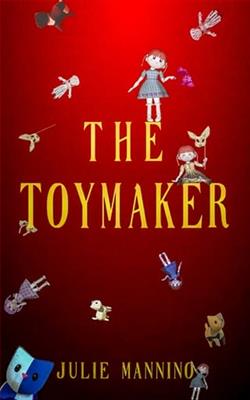Martial Peak Reviews
Julie Mannino's The Toymaker is a compelling exploration of power dynamics, emotional vulnerability, and the complexities of human relationships. Set against the backdrop of a seemingly whimsical world of toys, the novel delves deep into the intricacies of submission, control, and the quest for self-identity. The narrative is as much about the characters' internal struggles as it is about their interactions with each other, making it a profound read for those interested in psychological and emotional depth.
At the heart of the story is Kit, a character whose journey is both poignant and unsettling. The contract he enters with Trig, the toymaker, is not just a literal agreement but a metaphorical one, representing the surrender of autonomy in exchange for perceived needs. This dynamic sets the stage for a narrative that is rich in tension and introspection. Kit's journey is one of learning self-control, but it is also about understanding the nature of his desires and the cost of fulfilling them. Mannino skillfully portrays Kit's internal conflict, making him a relatable and sympathetic character despite the unconventional circumstances he finds himself in.
Trig, the toymaker, is a fascinating character whose motivations are as enigmatic as they are unsettling. He embodies the theme of control, not just over Kit and Riju, but over the narrative itself. Trig's manipulation and the psychological games he plays are reminiscent of characters in works by authors like Gillian Flynn, where the antagonist's influence is pervasive and insidious. Mannino's portrayal of Trig is nuanced, avoiding the trap of making him a one-dimensional villain. Instead, he is a complex figure whose actions, while often morally ambiguous, are driven by a twisted sense of care and protection.
Riju, the apprentice, adds another layer of complexity to the story. His relationship with Kit is tender and genuine, providing a stark contrast to the domineering presence of Trig. Riju's characterization is particularly noteworthy for its sensitivity and depth. He is portrayed as someone who is not "right in the head," yet Mannino treats him with dignity and respect, challenging societal perceptions of mental health and capability. Riju's dream of owning a children's toy shop, dismissed by Trig as silly, is a poignant symbol of his desire for independence and normalcy. This dream, however, is constantly under threat, highlighting the precariousness of his situation.
The theme of control is central to The Toymaker, and Mannino explores it with a deft hand. The spelled toy that Kit is required to wear for a year is a powerful symbol of this control, representing both a physical and psychological restraint. The novel raises important questions about the nature of consent and the fine line between submission and coercion. Mannino does not provide easy answers, instead inviting readers to grapple with these complex issues alongside the characters.
One of the most striking aspects of the novel is its exploration of the relationship between Kit and Riju. Their bond is portrayed with a tenderness that is both heartwarming and heartbreaking. Mannino captures the nuances of their connection, from the initial attraction to the deepening emotional intimacy. This relationship serves as a counterbalance to the oppressive atmosphere created by Trig, offering a glimmer of hope and possibility. However, as the narrative progresses, the strain on their relationship becomes apparent, leading to a climax that is as inevitable as it is devastating.
Mannino's writing is both evocative and precise, capturing the emotional landscape of her characters with remarkable clarity. Her prose is imbued with a sense of melancholy, reflecting the underlying sadness and longing that permeates the story. The world she creates is richly detailed, with the toy shop serving as a microcosm of the larger themes at play. The juxtaposition of the innocence associated with toys and the darker elements of the narrative adds a layer of complexity that is both intriguing and unsettling.
In comparison to other works in the genre, The Toymaker stands out for its psychological depth and character-driven narrative. While it shares thematic similarities with novels like Fifty Shades of Grey by E.L. James, particularly in its exploration of power and submission, Mannino's approach is more nuanced and introspective. Her focus on the emotional and psychological aspects of the characters' relationships sets it apart, offering a more thoughtful and engaging reading experience.
Overall, The Toymaker is a thought-provoking and emotionally resonant novel that challenges readers to consider the complexities of human relationships and the nature of control. Julie Mannino has crafted a story that is both unsettling and beautiful, leaving a lasting impact on those who venture into its pages. For readers seeking a novel that combines psychological depth with a compelling narrative, The Toymaker is a must-read.
























Reviews 0
Post a Reviews: